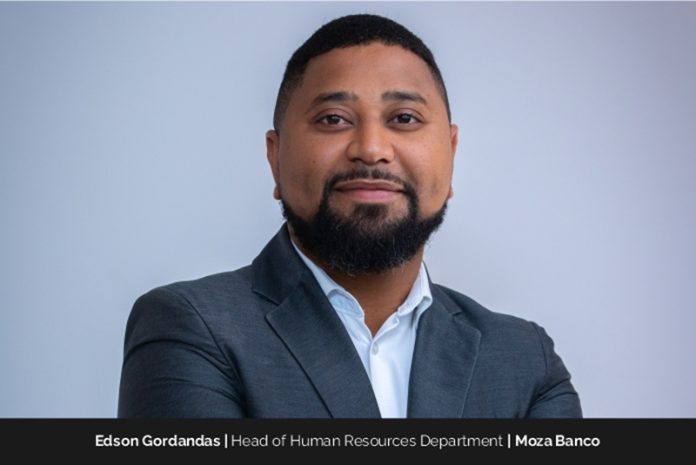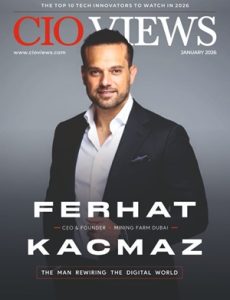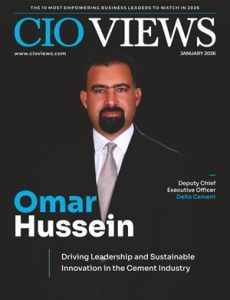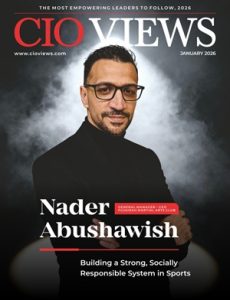Leading the HR department at Moza Banco, one of Mozambique’s fastest-growing financial institutions, Edson Gordandas’ career journey is unexpected, to say the least. Carrying a degree in statistics, he never saw himself working in the Human Resources department, but life is full of surprises.
He enrolled in a Trainee program at Vale, thinking he’d be working in finance, but he was accepted into HR in the Planning and Control Department. It was thanks to this gateway and allocation in this department that today has this overall top-down view of HR, as he needed to interact with all the human resource departments, as training, recruitment, payroll, and business partnerships. Edson’s passion for HR began at this point. Since he started working in this department, as a business partner, his passion for working with people was fueled even more when start to work in this position. and he expressed his gratitude to start from there. “I believe that working with all these areas shaped my mindset to think strategically,” he notes. His responsibilities lay in creating and controlling the HR budget, preparing the monthly report and presentation of all HR, and make the HR activity plan, all of which were aligned with the organization’s strategy, the reason why he has a resolute commitment to the fulfillment of the objectives of the organization.
This seasoned executive leads with adaptability rather than fixed philosophies. His leadership approach shifts according to the context, team dynamics, and organizational goals. He emphasizes communication, alignment, and clarity within his team. By listening actively and ensuring that strategies are well understood, he fosters cohesion and adherence to policy throughout the HR department.
Dealing with Big HR Problems and Pushing for Strategic Innovation
Edson has faced numerous challenges throughout his career. He was in charge of making the HR Management Department at Moza Banco while the whole system was being changed, which included adding SAP for payroll. Not long after that, the Central Bank had to step in and make the Bank lay off workers to keep it financially stable.
He was in charge of HR during the merger of two banks in 2019, and he did it all without outside help. After that, he wrote a whole new Compensation and Benefits Policy from scratch. These efforts helped Moza Banco get named one of Mozambique’s “10 Best Organizations to Work For” for the fourth time, especially in areas like pay, career growth, and work-life balance.
Finding a Balance Between Strategic Oversight and Employee Health
This industry leader emphasizes the importance of planning. At the beginning of each year, he sets up HR tasks and projects that fit with the Bank’s budget and essential roadmap. This structured method lets him be flexible enough to meet the needs of each employee.
Moza Banco also set up a social department and “Clube Moza,” an employee-led group that focuses on well-being, sustainability, and social responsibility. The Global Banking & Finance Awards recently gave the Bank the Best CSR Program for Employee Engagement in Mozambique (2025) award for this project.
Key HR Achievements Driving Moza Banco’s Success
There’s a certain precision with which Edson prefers to lead. It’s not about ticking off milestones. Rather, it’s about shaping legacies. As one of The 10 Most Influential HR Executives to Follow in 2025, his impact at Moza Banco has been quietly revolutionary.
During his tenure as Head of Human Resources, Edson’s fingerprints are evident in nearly every transformative initiative that has advanced both culture and capability. He led the design and rollout of a new Performance Evaluation framework—not just a corporate formality but a living system that elevated accountability and inspired career ownership.
When the Bank embraced SAP RH for its payroll function, Edson was at the forefront of aligning people, processes, and platforms to ensure seamless implementation with long-term benefits. His calm, confident leadership became especially essential during a major merger of two banks, where he supervised a smooth HR integration while maintaining the morale and cohesion of the workforce.
He also championed the launch of a comprehensive training system, drawing on his understanding of technology and learning design to deliver a resource that continues to build depth in talent and knowledge.
One of his most enduring contributions was engineering Moza’s Compensation and Benefits policies structure from the ground up, an ambitious endeavor that reflected his commitment to fairness, clarity, and value.
More recently, he partnered with the IT team to bring a custom-built Vacation and Attendance Management System to life, leveraging Agile methodology to deliver real-time, employee-centered results.
From lowering operational costs to simplifying HR processes and elevating employee engagement, Edson’s imprint is everywhere. Quietly and deliberately, he has undoubtedly shaped a workplace and a future where people and progress move forward together.
Building a Culture of Involvement, Progress, and Development at Moza Banco
Moza Banco’s strong organizational culture was developed from the beginning. Since the Bank was only 18 years old, it first hired professionals from other banks, which resulted in a wide variety of viewpoints and experiences.
Moza Banco started holding cultural training sessions led by its own staff to bring this diversity together by fostering alignment and instilling shared values. Edson highlights that employee engagement and cultural alignment are still crucial despite the Bank’s continuous technological transformation. The foundation of Moza Banco’s ongoing success is the integration of people and technology.
Even though Moza Banco is a smaller organization, it provides a lot of chances for professional growth. There are still plenty of leadership roles available, which gives internal talent room to develop. The HR team is now creating Career and Succession Planning Policies that will offer distinct career paths in order to facilitate this. Meanwhile, the Bank’s dedication to internal growth is further reinforced by the frequent promotions that take place.
Technology is also essential to HR strategy because it promotes productivity, involvement, and flexibility. Edson claims that Moza Banco’s continuous recognition as one of the Top 10 Best Places to Work in Mozambique is mainly due to its innovative and people-focused approach.
How Moza Keeps Great Talent in a Competitive Market
In today’s competitive market, Edson knows talent acquisition and retention is not easy. Rising wages and the rapid growth of communication companies only heighten the stakes. But for him, the solution isn’t about chasing trends or flashy perks. Instead, it’s about getting the basics right. Good policies of compensation and benefits, a healthy work culture, and real support for work-life balance, these are the pillars he believes make the difference. When these initiatives are thoughtfully implemented, Edson believes they naturally lead to strong retention and growing interest in joining Moza, making it a magnet for fresh talent.
Rather than following conventional retention models, the Bank works from a clear list of key people in each department, equipping them with the right tools, targeted training, and timely wage increments. Such an approach helps the employees to stay motivated and invested. While this strategy has delivered results, it occasionally comes with its own set of challenges.
Building Belonging: How Moza Banco Puts Inclusion into Action
Diversity and inclusion aren’t just jargon in modern HR sector; they’re the building blocks of a successful, future-ready workplace. Senior leaders are expected to do more than just follow the rules. They need to take real steps to make sure that every employee feels seen, supported, and valued.
How is this implemented at Moza Banco? According to Edson, diversity and inclusion are integral to the Bank’s culture and personnel strategy. To foster a sense of belonging among teams, the organization has initiated various initiatives, including Clube Moza, employee surveys, and seminars led by the Social Department, which are open to all employees.
He shares that 48% of Moza’s employees are women. Not just that, 35% of them hold management positions, including branch managers. The Bank also supports employees with disabilities or long-term illnesses by ensuring they can fully participate in daily operations without facing unfair treatment. Edson stresses that the Bank’s rules strongly oppose sexism, racism, and other forms of moral and sexual harassment, while the Social Department actively works to eliminate exclusion. In his words, “Our policies clearly state our disapproval of practices of discrimination based on gender, race, and moral and sexual harassment.”
Edson’s Vision for the Future of HR in the African Banking Sector
Edson thinks that the future of Human Resources will be more strategic, especially in the African banking industry. He stresses that HR professionals need to become real partners with their companies and be able to adapt to new needs by focusing on essential skills like cost management, operational efficiency, employee engagement, labor relations, resilience, and remote work.
“I really believe that the HR department will not disappear, so HR has to work more closely with the IT Departments to understand the digital transformation.” He adds. As artificial intelligence (AI) becomes more common, especially in Africa’s banking industry, where customers are becoming more demanding, HR needs to be able to adapt and have the right skills to help with this change.
Edson is an integrated part of a complete digital transformation program at Moza Banco. This program includes upgrading the data center, modernizing channels, overhauling the core banking system, culture and changing the way the company works. This change is based on smart investments in both technology and training for employees. Such measure ensures that the workforce is fully ready to thrive in a digital landscape that evolves quickly.
Essential Tips for Future HR Professionals Hoping to Become Significant Leaders
The veteran emphasizes that a genuine passion for working with people is vital to success in human resources, drawing on his own experience. “Without this ingredient, you will not understand the word ‘Empathy.’,” Edson adds, “It is not about listening to people; it’s about ‘wearing’ the problem and thinking it were you.”
He advises prospective HR professionals to make a commitment to lifelong learning by reading widely, going to seminars, receiving training to stay current, and actively exchanging ideas. He also emphasizes the value of listening well and having a significant influence on other people’s lives by providing support and direction rather than criticism.
Above all, Edson counsels aspiring HR directors to match their goals with the strategic objectives of their company. He encourages professionals to work diligently until their ideas are implemented and yield measurable results, particularly when it comes to improving costs, policies, and procedures.
Matching HR Procedures to Moza Banco’s Business Goals
Edson uses a proactive, data-driven approach to make sure Moza Banco’s HR strategies are closely linked with the Bank’s overarching business objectives. To determine whether their efforts are in line with organizational priorities and employee expectations, the HR department carries out an internal strategic survey every two years. This feedback loop fosters a cooperative workplace where staff members actively participate in forming HR initiatives and policies.
To compare its position to rivals, Moza Banco frequently takes part in market-wide Compensation and Benefits Surveys in addition to internal surveys. HR creates focused strategic plans based on the findings to preserve or improve competitiveness in luring and keeping talent.
He stresses that although not all employee suggestions can be carried out, the emphasis is still on responding to input that is strategically valuable and sustainable for the Bank. This constant process of evaluation and modification guarantees that HR will continue to assist the Bank’s expansion and strengthen its edge over competitors in the financial industry.
Assessing HR Impact at Moza Banco
At Moza Banco, measuring the real impact of HR initiatives goes beyond just checking boxes. Every two years, the team rolls out an internal survey to gauge how employees truly feel and whether the Bank’s efforts are making a difference and achieving the desired outcomes.
Edson explains that the focus areas shift depending on where the Bank wants to grow. However, the core themes remain consistent, including strategic planning, leadership effectiveness, employee recognition, commitment levels, opportunities for growth, the overall work environment, performance evaluation processes, and the impact of newly introduced initiatives.
Vision for Strategic HR
When asked about his ultimate aspiration for HR’s role in the banking industry, Edson doesn’t hesitate. “My ultimate aspiration is for HR to be seen as part of the Strategic Plan of all organizations,” he remarks. “Because I see many people talking about it ‘HR Strategic,’ but it long to be effective in their organizations.”
At Moza Banco, he’s already laying the groundwork. The Bank has established a dedicated Board Members Committee for People Management; a high-level forum focused exclusively on HR matters. For Edson, it’s a tangible step toward making HR truly strategic, and he hopes other organizations will follow suit.
Looking ahead, his personal legacy centers on passing the torch. He’s focused on developing a successor equipped with a rare blend of HR expertise. This includes expertise in HR strategy, budget planning, performance evaluation, business partnering, payroll, employee development, and training. Within Moza Banco, his ongoing contribution lies in implementing effective policies, procedures building a modern HR system that streamlines processes, reduces costs, minimizes paper usage, and supports sustainable and positive work environment, including a work-life balance.





